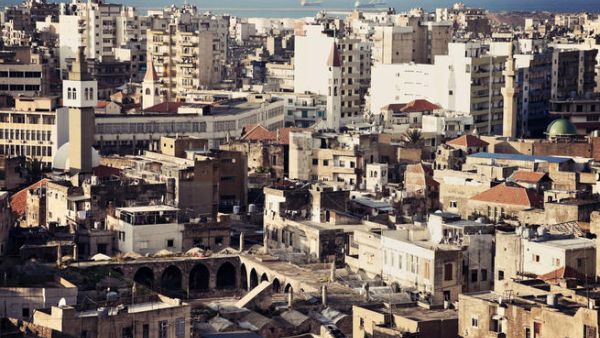By Jana El Hassan
The absence of the rule of law in Tripoli has paved the way for thugs to collect protection money from merchants in the northern city of Tripoli’s centuries-old souks, who dole out fees just to keep them away.
The trend of criminal groups or individuals coercing businesses to pay money for supposed protection services has been on the rise in the northern city, especially in recent months, and those involved in the scheme are afraid to speak out, fearing that their businesses might be at risk of being shut down by thugs if they do.
“This started almost three years ago but the situation is getting worse day after day,” Abu Hatem, a city guide, told The Daily Star, while walking in the Old City souks. “All the shops you see here are paying protection money, though many merchants will deny it.”
According to Abu Hatem, criminal groups have divvied up the city’s neighborhoods to share control, especially in areas susceptible to violence, such as Bab al-Tabbaneh and Jabal Mohsen.
“Let’s say someone is imposing protection racketeering in particular neighborhoods, ones which other gangsters would not come near,” he said, divulging the names of well-known gangsters involved in the illicit practice, such as Saad Masri, Fadi Kahil, Ali Harrash and Mahmoud Hajj.
A Tripoli merchant, who requested to remain anonymous, said one thug had been shot and wounded two days before Eid al-Fitr:
“He is in hospital now and he is suffering from leg injuries, but sooner or later he will recover and resume his activities in the souks.”
According to the merchant, protection fees can range from $100 to $2,000, sometimes more.
“It depends on the nature of the business and the season,” the merchant explained.
“During Eid, they asked the merchants for a lot of money, and they have no other choice but to pay.”
He points to a carpet store nearby, explaining that it had been burned recently because its owners had refused to pay protection fees.
“They reopened it not too long ago and they are paying [the fees] now, but you can see the marks from the fire at the store’s door,” he said.
Other shops in the Old City remained closed because owners were not bringing in enough profit to pay off the thugs, whose financial demands are said to increase day by day.
Inside the Souk al-Attareen, Ahmad, a merchant, said that gangsters come in and fire gunshots in the air to intimidate customers, forcing them to leave the markets.
“Gunmen come in and they threaten to intimidate our customers if we don’t pay them,” he said.
He explained that in the past, merchants would pool together a small amount of money to keep the thugs out of the souks, “but such small amounts are no longer enough for them, they are taking much more.”
Another shop owner, Abu Bilal, said the recurrent clashes in the souks were linked to protection racketeering.
“Some people have been wounded and even killed for this. ... It is very serious,” he said.
Abu Bilal said that in the souks of Khan Saboun, some stores were broken into.
“You go to the police to complain but they put you in jail instead of the [assailants],” he said.
He said one of the money-collecting thugs had four sons who behaved as though the souks was theirs alone: “They come into any shop, pick whatever they want and just leave without paying or even asking about the cost.”
According to Abu Hatem, some thugs are linked to politicians and others to sheikhs and field commanders in different neighborhoods.
“Some sheikhs issue fatwas to their followers and tell them that it is halal [permitted] for them to collect protection money on merchants. ... They even have a fund for the jihadists from Bab al-Tabbaneh,” he said.
Protection racketeering is also on the rise in Tripoli’s vegetable market and the Souk al-Bazerkan, leaving Alawites who own shops in central Tripoli especially vulnerable.
Tripoli’s recurrent clashes are often fought between the Sunni-majority neighborhood of Bab al-Tabbaneh and the Alawite neighborhood of Jabal Mohsen.
One taxi driver pointed to a store selling cell phones in the heart of the city and said its Alawite owner was paying over $1,000 a month to keep the thugs away:
“He works wholesale so he has money, because he pays them a lot.”
Very few soldiers could be seen in the city’s markets, along the souks toward Syria Street, where Bab al-Tabbaneh is located.
The majority of shops here are closed, not because owners are unable to pay protection fees but for fear of renewed clashes.
Still, protection racketing is common here too, as one resident said, “It even concerns satellite television suppliers, bakeries, restaurants and private power generators.”
Extortion in the private generator business is different from the typical protection racketing schemes, as the suppliers themselves tend to impose cruel conditions on their clients.
“They impose high and unreasonable costs and if someone even thinks of changing suppliers, he will face hell,” said Abir, a hairdresser in Tripoli. Abir said that when she tried to change her generator supplier, he cut off the electricity in her salon, obliging her to continue subscribing to his services.
“I had no other choice but to do as he wanted and use his services again. My customers warned me that he was very powerful, a ruthless gunmen who no one in the neighborhood could stand up against,” she said.
“I was afraid that he would confront my husband and kill him or something,” she said. “My husband’s life could have been taken away in such a wasteful way, as do the lives of so many of our youth, so I preferred to keep the incident a secret from him.”









